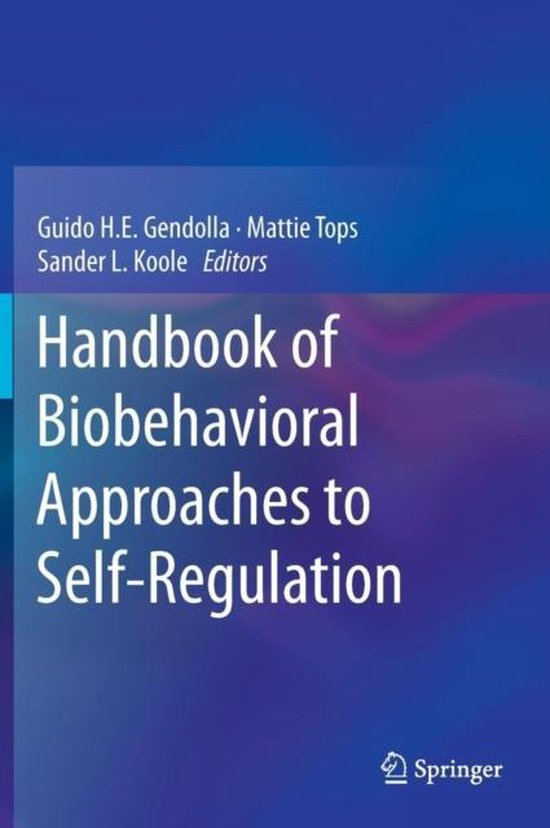Handbook of biobehavioral approaches to self regulation

2 - 3 weken
Handbook of Biobehavioral Approaches to Self-Regulation
How can people master their own thoughts, feelings, and actions? This question is central to the scientific study of self-regulation. The behavioral side of self-regulation has been extensively investigated over the last decades, but the biological machinery that allows people to self-regulate has mostly remained vague and unspecified. Handbook of Biobehavioral Approaches to Self-Regulation corrects this imbalance. Moving beyond traditional mind-body dualities, the various contributions in the book examine how self-regulation becomes established in cardiovascular, hormonal, and central nervous systems. Particular attention is given to the dynamic interplay between affect and cognition in self-regulation. The book also addresses the psychobiology of effort, the impact of depression on self-regulation, the development of self-regulation, and the question what causes self-regulation to succeed or fail. These novel perspectives provide readers with a new, biologically informed understanding of self-awareness and self-agency. Among the topics being covered are:
Self-regulation in an evolutionary perspective. The muscle metaphor in self-regulation in the light of current theorizing on muscle physiology. From distraction to mindfulness: psychological and neural mechanisms of attention strategies in self-regulation. Self-regulation in social decision-making: a neurobiological perspective. Mental effort: brain and autonomic correlates in health and disease. A basic and applied model of the body-mind system.Handbook of Biobehavioral Approaches to Self-Regulation provides a wealth of theoretical insights into self-regulation, with great potential for future applications for improving self-regulation in everyday life settings, including education, work, health, and interpersonal relationships. The book highlights a host of exciting new ideas and directions and is sure to provoke a great deal of thought and discussion among researchers, practitioners, and graduate-level students in psychology, education, neuroscience, medicine, and behavioral economics.
How can people master their own thoughts, feelings, and actions? This question is central to the scientific study of self-regulation. The behavioral side of self-regulation has been extensively investigated over the last decades, but the biological machinery that allows people to self-regulate has mostly remained vague and unspecified. Handbook of Biobehavioral Approaches to Self-Regulation corrects this imbalance. Moving beyond traditional mind-body dualities, the various contributions in the book examine how self-regulation becomes established in cardiovascular, hormonal, and central nervous systems. Particular attention is given to the dynamic interplay between affect and cognition in self-regulation. The book also addresses the psychobiology of effort, the impact of depression on self-regulation, the development of self-regulation, and the question what causes self-regulation to succeed or fail. These novel perspectives provide readers with a new, biologically informed understanding of self-awareness and self-agency. Among the topics being covered are:
Self-regulation in an evolutionary perspective. The muscle metaphor in self-regulation in the light of current theorizing on muscle physiology. From distraction to mindfulness: psychological and neural mechanisms of attention strategies in self-regulation. Self-regulation in social decision-making: a neurobiological perspective. Mental effort: brain and autonomic correlates in health and disease. A basic and applied model of the body-mind system.Handbook of Biobehavioral Approaches to Self-Regulation provides a wealth of theoretical insights into self-regulation, with great potential for future applications for improving self-regulation in everyday life settings, including education, work, health, and interpersonal relationships. The book highlights a host of exciting new ideas and directions and is sure to provoke a greatdeal of thought and discussion among researchers, practitioners, and graduate-level students in psychology, education, neuroscience, medicine, and behavioral economics.
- 1 Bekijk alle specificaties
Taal: en
Bindwijze: Hardcover
Oorspronkelijke releasedatum: 23 september 2014
Aantal pagina's: 421
Illustraties: Nee
Hoofdredacteur: Guido H.E. Gendolla
Tweede Redacteur: Mattie Tops
Co Redacteur: Sander L. Koole
Hoofduitgeverij: Springer-Verlag New York Inc.
Editie: 2015 ed.
Extra groot lettertype: Nee
Product breedte: 184 mm
Product hoogte: 32 mm
Product lengte: 260 mm
Studieboek: Nee
Verpakking breedte: 178 mm
Verpakking hoogte: 32 mm
Verpakking lengte: 254 mm
Verpakkingsgewicht: 9586 g
EAN: 9781493912353